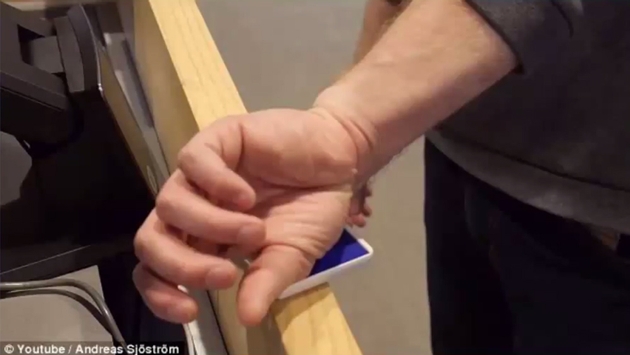By Josh Lew
These days, flying means having your travel documents in order and carrying multiple forms of identification. American fliers could potentially even have to carry a passport on domestic flights if their state does not stick to the government’s Real ID timeline.
In the future, however, this kind of ID hassle could go away altogether. Fliers could leave all their IDs at home and breeze through ticketing and security. This might sound like a pipe dream, but the technology is, apparently, already available. A Dutch man actually put the ID-free idea to the test at Stockholm’s Arlanda Airport.
Carrying your information inside yourself
Great strides have been made in the field of biometrics in the past few years. Some airports do, indeed, use fingerprinting and retinal scans to confirm passengers’ identity, especially for the various pre-check programs. The high-tech tool that allowed Dutch tech entrepreneur Andreas Sjöström to breeze through Stockholm’s hub without a ticket, boarding pass or passport was much different than a digital fingerprinter, however.
Sjöström had something called a near-field communication (NFC) chip implanted just under the skin on his hand. Since Arlanda has NFC readers, which are usually used to scan contact-less cards or smartphones, Sjöström only had to waive his hand over the readers and the chip, which held his Scandinavian Airlines EuroBonus member ID, would be read and his travel plans and identification confirmed.
Infrastructure is already in place
Having a chip implanted under your skin is not something that every travel would consider doing. However, it does make sense considering how widely available NFC readers are. Developing this kind of product for mass usage would be easy because airports would not need to get any special new machines to scan passengers’ hands and retrieve the relevant information.
The chip used by Sjöström was created by a tech company called Dangerous Things. He claimed that the process of implanting the chip was not painful, and that the only way to tell it is there is by running his hand over the tiny bump it created. Dangerous Things actually sells kits (complete with surgical gloves) that allow customers to implant the chips themselves.
A lot more development is needed
Sjöström mentioned that such under-skin implants might not be necessary in the future if the chips could be developed to securely stick to the outside of the skin without falling off.
On one hand, it seems like having your ID physically attached to your body would make it more secure. At the same time, however, there are bound to be lots of questions. What if someone had an NFC reader? Could they brush by you, scan your implanted chip and then have access to your information? If the chip was attached to the outside of your hand, could it fall off and could someone else then locate it, pick it up and use your identity?
There is a lot of things to be worked out before this kind of sci-fi scenario becomes a reality. People will still be required to carry a passport and either a boarding pass or a smartphone with their flight information for the foreseeable future.
Things like fingerprinting and retinal scanning are more developed at this point. However, because the infrastructure for reading NFC chips is already in place, eventually having all your information implanted in your hand – or somehow stuck to your body – is not beyond the realm of possibility.
Steele Luxury Travel
www.SteeleTravel.com

